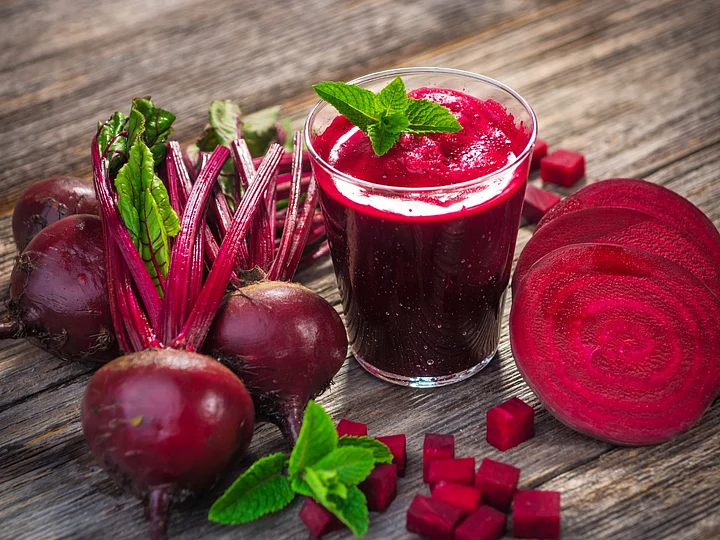People often do not like eating beetroots due to their knobby, blood-red, and rich, earthy aroma but trust us, it is worth learning about the nutritional facts and benefits of the vegetable. Beetroots are included in the diet by doctors and nutritionists for their unique cardiovascular and heart health benefits. Beets also contain a combination of compounds that help enhance blood flow, improve the health of arteries, support lower homocysteine levels, and reduce LDL cholesterol.
The color and dense nutrition of beetroots are due to the betalains, a type of natural plant pigment that has antioxidant and anti-inflammatory properties. Beetroots are low in calories but high in nutrients thus they can be included in soups, salads, cooked vegetables, etc. Now, let's dive deep into the health benefits of beetroots.
What Are the 7 Benefits Of Beetroot?
1. Helps Manage Blood Pressure- Beetroots have the ability to decrease elevated blood pressure levels, which are a major risk factor for heart disease. Also, beetroot juice could lower levels of both systolic and diastolic blood pressure. The blood-pressure-lowering effects of beetroots are due to the high concentration of nitrates and in your body, dietary nitrates are converted into nitric oxide that dilates blood vessels and causes blood pressure levels to drop.
2. Helps Enhance Athletic Performance- Beetroots help enhance athletic performance due to their dietary nitrates. As these nitrates affect physical performance by improving the efficiency of mitochondria, which are responsible for producing energy in your cells. Beetroot juice also helps enhance endurance by increasing how long it takes to become exhausted, boosting cardiorespiratory performance, and improving efficiency for athletes.
3. Helps Fight Inflammation- Beetroot contains pigments called betalains, which have a number of anti-inflammatory properties that benefit several aspects of health, as chronic inflammation is said to be associated with conditions like obesity, heart disease, liver disease, and cancer. A study of people with osteoarthritis a condition that causes inflammation in the joints showed that betalains capsules made with beetroot extract reduced pain and discomfort.
4. Improves Brain Function- The nitrates contained in beets help improve brain function by promoting the dilation of blood vessels thus helping increase blood flow to the brain. Beetroot is recommended for the betterment of mental and cognitive functions that naturally decline with age and increase the risk of neurodegenerative disorders like dementia.
5. Improves Digestive Health- Beetroot is a good source of fiber. The fiber in beets bypasses digestion and travels to the colon, where it feeds friendly gut bacteria, adds bulk to stools, and helps promote digestive health thus preventing digestive conditions like constipation, inflammatory bowel disease (IBS), and diverticulitis. In addition, fiber is also said to help reduce the risk of chronic diseases, including colon cancer, heart disease, and type 2 diabetes.
6. Reduces the Risk Of Cancer- Beetroot contains several compounds that help fight cancer. These compounds include betaine, ferulic acid, rutin, kaempferol, and caffeic acid. However, more research is needed to confirm the anti-cancer properties of beetroot. Studies have found that having higher blood levels of betaine may lower the risk of cancer.
7. Helps Balance Energy- Beetroots are low in fast and calories but high in water which makes it a healthier vegetable than most other foods. The root vegetable also aids weight loss and due to the moderate protein and fiber content can help maintain a healthy weight. The high fiber content makes you feel full for long and prevents you from overeating.
(At The Quint, we question everything. Play an active role in shaping our journalism by becoming a member today.)
